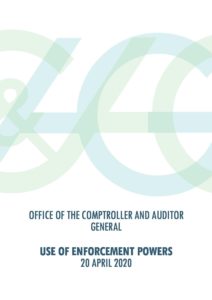
Monday 20 April 2020 - Report
Monday 20 April 2020 - Report
Topics: Governance
Departments: Housing
Sector: Regulation

Report: pdf (444.10 KB)
Download in full ↓The Government of Jersey operates a number of regulatory functions, predominantly within the Growth, Housing and Environment Department. The applicable legislation gives certain powers to the Government of Jersey to enforce compliance with decisions, legislation and regulation.
The review has evaluated:
In undertaking the work, the review considered:
There needs to be a stronger and consistent focus on engaging with individuals and organisations about the nature of regulatory activities and the enforcement powers available to the Government of Jersey. Enhancing communication and engagement should reduce the subsequent need to use enforcement powers.
Some enforcement activities have well documented procedures supported by adequate training of the staff involved and good systems for documenting and reviewing decisions. This is not however consistent across all areas. The Government of Jersey should focus on ensuring that good practice is shared and operated across all enforcement activities.
In order to demonstrate the objectivity of enforcement decisions there need to be more explicit processes to manage conflicts of interest and clear published policies for the exercise of discretion.
There has been an inadequate focus on monitoring performance on or implementing structured improvement in enforcement activities. In the case of planning and building control, performance on enforcement has been poor. At the same time, there has been no structured approach to the implementation of previous recommendations relating to enforcement in planning and building control and performance has deteriorated further. Implementing the Target Operating Model may ensure that the team is adequately resourced to improve performance in the short-term and implement longer-term improvement initiatives.

Associate Member of EURORAI - a cooperation project between public sector supervisory bodies in Europe